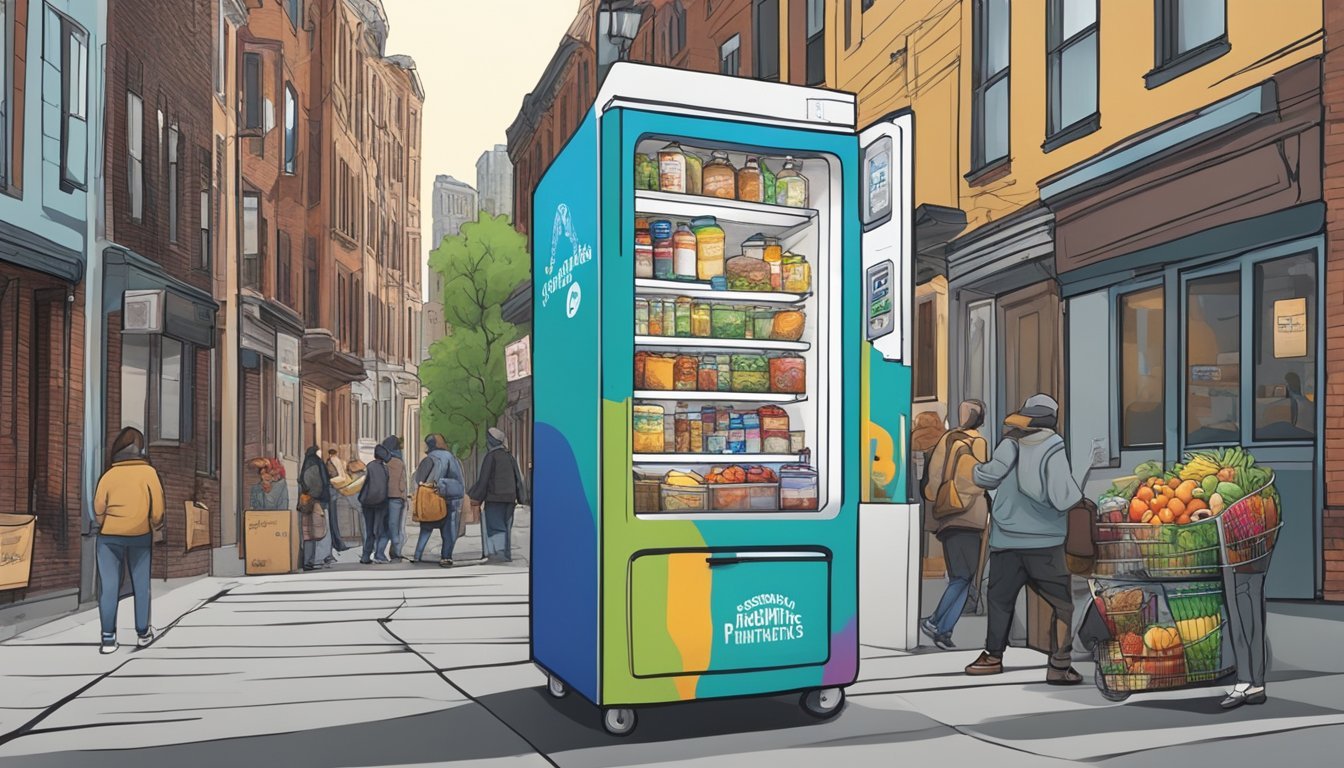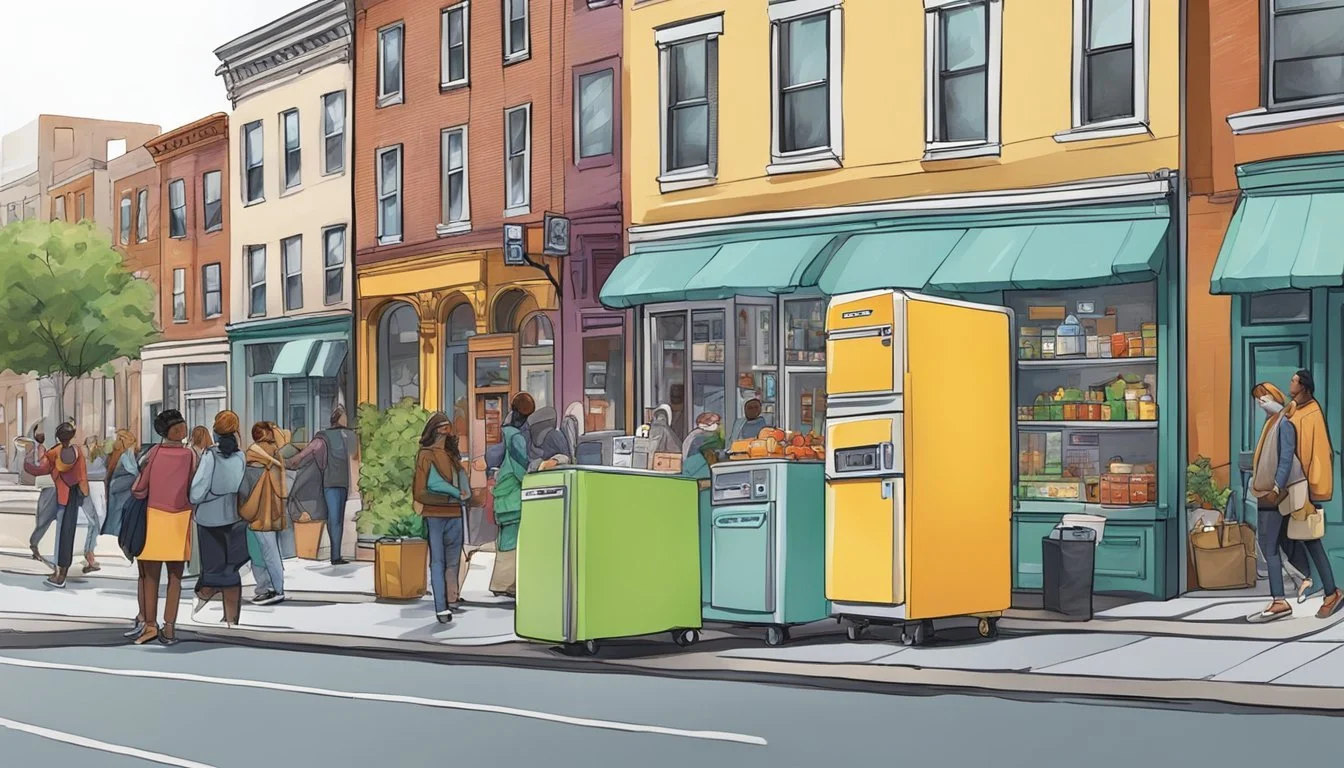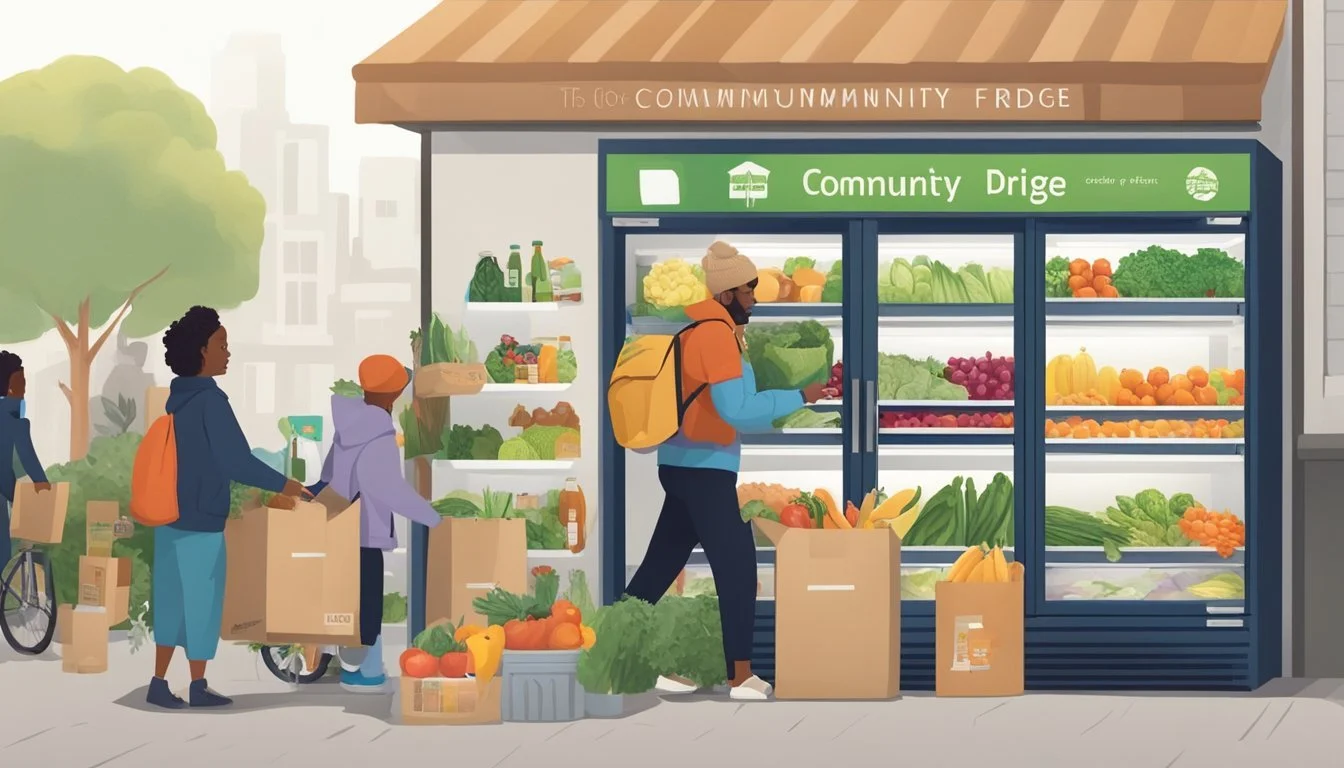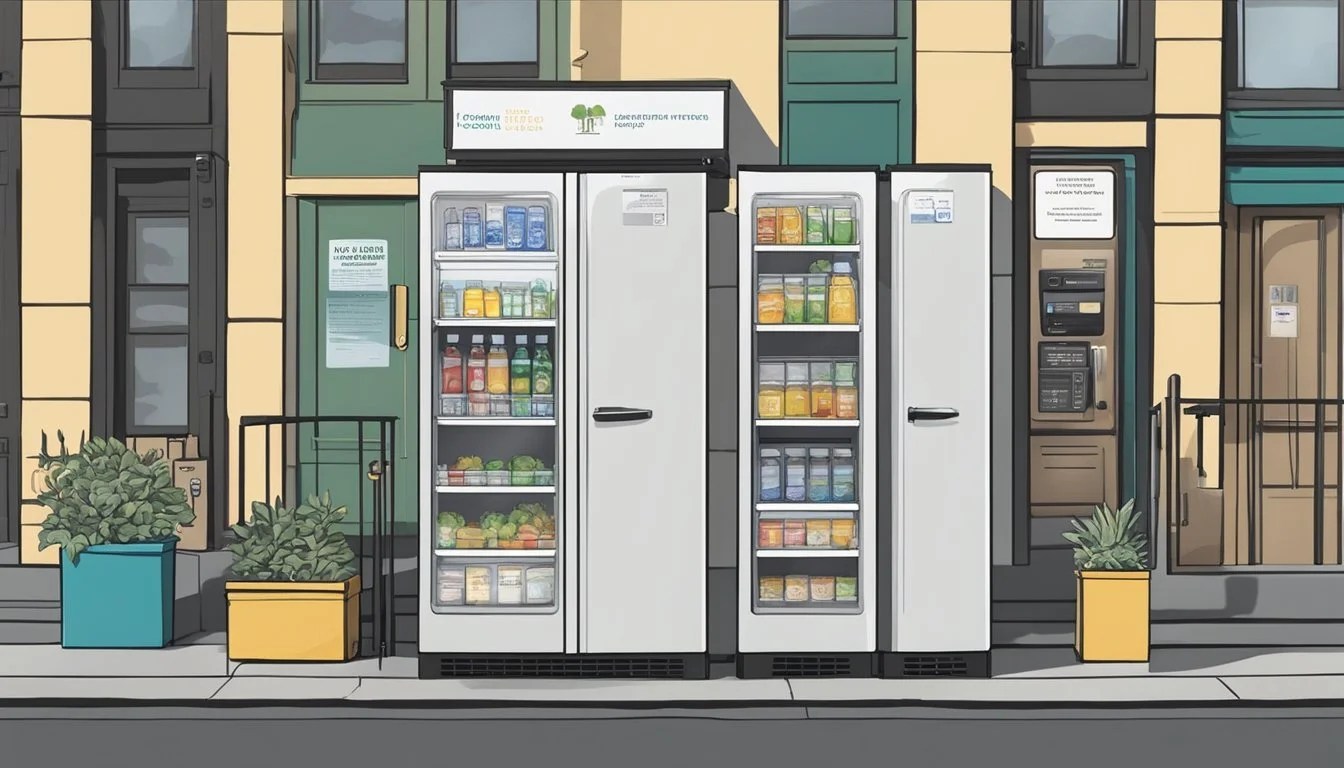Philadelphia, PA Community Fridge
Tackling Hunger with Communal Compassion
Philadelphia has seen a remarkable rise in a grassroots phenomenon aimed at tackling food insecurity: community fridges. These refrigerators, often colorfully decorated and placed in accessible outdoor locations, offer a simple solution for sharing food within communities. Citizens and local businesses alike contribute perishable and non-perishable items to these fridges, making it a collaborative effort in solidarity. The fridges operate on a 'take what you need, leave what you can' philosophy, ensuring that there is no waste and that those in need have access to fresh and healthy food options.
The City of Brotherly Love has embraced the community fridge initiative, particularly during challenging times such as the pandemic, which exacerbated the hunger issue. In neighborhoods across Philadelphia, nearly 30 fridges have sprung up, serving as silent heroes. They bridge the gap between surplus and scarcity, all the while providing a dignified experience akin to grocery shopping.
These fridges not only address immediate food needs but also foster a sense of community and support the local ethos of caring for one's neighbors. Organizations and volunteers maintain these community fridges, and their continued operation relies on the generosity and civic spirit of Philadelphians. The initiative is a testament to the city’s resilience and commitment to mutual aid, standing out as a beacon of hope and cooperation in urban food assistance.
History and Mission
Philadelphia's Community Fridge movement is rooted in an extensive tradition of mutual aid, with the mission to tackle food insecurity magnified by the pandemic. These fridges serve as a testament to the city's collaborative spirit and dedication to addressing hunger through accessible and communal means.
Genesis of the Movement
The Community Fridge movement in Philadelphia was inspired by a long-standing tradition of mutual aid within the city. It traces back to the Free African Society (FAS), established in 1787 by Richard Allen and Absalom Jones. This reflects Philadelphia's historical commitment to providing support for the vulnerable members of its community. The first community refrigerator in the city was set up outside Radiance Medical Group in August 2020 and has since become a symbol of grassroots efforts to foster mutual aid.
Addressing Food Insecurity
Community Fridges in Philadelphia are strategically placed to offer healthy food options to those in need. During the Covid pandemic, the number of fridges expanded rapidly, with the city boasting around 30 fridges by late 2022. These fridges represent a direct response to escalating hunger issues and are a visible reminder of Philadelphia's resolve to combat food insecurity. The fridges are stocked with food that is available to anyone, emblematic of the community's solidarity and collective action in face of adversity.
Locations and Impact
As initiatives to combat food insecurity, community fridges in Philadelphia have become important resources. They offer free food to those in need and enable community members to share provisions in a united effort.
Key Fridge Sites
In South Philadelphia, the South Philadelphia Community Fridge operates effectively, helping to bridge gaps in food access within zip codes such as 19145 and 19146. East Falls hosts another vital fridge location, becoming a centerpiece in fighting hunger. Fridge sites within Germantown, West Philly, and Fishtown also provide nourishment and communal support. The network even stretches into historically underserved areas like Kensington, Nicetown, and Fairmount, indicating a city-wide distribution that attends to various neighborhoods.
Neighborhood Outreach
Community fridges certainly go beyond just being food access points; they're pivotal in neighborhood outreach and support. For instance, in Philadelphia's 19147 area, a fridge does more than offer perishables—it's a symbol of a caring community. Likewise, North Philly sees fridges fostering a unique kind of solidarity among residents, reaffirming their neighborly commitments through each contribution and collection.
Operating A Community Fridge
Operating a community fridge in Philadelphia requires careful organization and community involvement to ensure its success. These fridges provide communities with access to fresh food, promoting mutual aid and a sense of shared responsibility.
Guidelines and Maintenance
Community fridges are maintained by volunteers and must adhere to strict guidelines to ensure the safety and cleanliness of the food provided. Electricity costs for these refrigerators are an important consideration, as they must operate continuously. Organizations like Sharing Excess and local businesses contribute by overseeing proper functioning and sanitation of these fridges. Volunteers regularly inspect and clean the fridges to prevent foodborne illness.
Food Safety: Regular checks for expiration and contamination
Cleanliness: Daily cleaning schedules to maintain hygiene
Monitoring: Volunteers monitor temperature and functionality
Funding and Donations
Funding for community fridges often comes from donations by individuals or support from local businesses and organizations. Donations can be made through platforms such as Open Collective, which provides financial transparency for donors. Contributions of food, especially from bakeries like Crust Vegan Bakery, and coordination with groups like Philly Food Rescue, help to stock the fridges with a variety of fresh and healthy options. Monetary donations are utilized to cover operational costs including electricity and repairs.
Financial Support: Online platforms for monetary donations
Food Contributions: Partnerships with local food producers and businesses
Operational Costs: Budget allocation for maintenance and electricity bills
Community Engagement
Philadelphia's community fridge initiative thrives on the concerted efforts of its volunteers and the steadfast collaborations with local businesses and organizations. Here, community engagement is more than a phrase—it's a dynamic force of collective action and mutual support ensuring access to free and healthy food.
Volunteer Roles
Volunteers are the backbone of the community fridge movement in Philadelphia. Their roles are diverse, encompassing activities from food stocking and fridge cleaning to outreach and fundraising. They also partake in organizing events to promote awareness and education about food insecurity. The inclusion and support of businesses such as Triple Bottom Brewing demonstrate the depth of community involvement, with such entities playing a critical part in both hosting fridges and driving volunteer efforts.
Food Sourcing and Donation: Volunteers collect surplus food from partners and local donors.
Maintenance: Scheduling regular checks and clean-ups for each fridge location.
Community Outreach and Education: Engaging citizens and local businesses to sustain and expand the network of fridges.
Community Partnerships
The success of the community fridge program in Philadelphia hinges on strong community partnerships. Businesses like Mina's World, a cafe in West Philadelphia, exemplify the potential of such collaborations by hosting fridges and contributing resources. They are not merely hosts for the fridges but active participants in the dialogue surrounding food justice and security.
Partnerships have been formed with a range of entities including:
Local Businesses: Restaurants, cafes, and breweries provide space and resources for fridge installations.
Not-for-Profits: Collaborative events and initiatives are organized to support the cause.
These alliances serve as a testament to the city's commitment to nourishing its residents through community-driven solutions.
Contributing to the Fridge
Contributors can support Philadelphia's community fridge network by providing food donations or financial and resource support. These fridges help alleviate food insecurity by allowing a space where individuals can donate and take food items as needed.
Food Donations
Accepted Food Items:
Produce: Any fresh fruit and vegetables should be clean and fresh.
Dairy: Sealed, unexpired dairy products are welcome.
When donating, individuals must ensure that food items are safe to consume. Community fridges typically accept a variety of perishable and non-perishable items but prioritize items that are in high demand such as fresh produce and dairy products. Contributors should check the freshness of items like fruits and vegetables to make sure they are ripe and free from spoilage. Dairy products must be unopened and should be donated well before the expiration date.
Financial and Resource Support
In addition to food donations, community fridges rely on:
Monetary Donations: Monetary support can be used for fridge maintenance and purchase of additional food supplies.
Supplies: Cleaning supplies and protective equipment help ensure the hygiene and safety of the fridge areas.
Financial contributions can be made directly to organizations that manage community fridges or through designated fundraising platforms. These funds are vital for the long-term sustainability of the fridges, covering costs such as repairs, electricity, and the purchase of supplemental food items to ensure a steady supply. Donors may often contribute resources like shelving units or refrigerators to enhance storage capabilities.
Sustainability and Future Goals
Philadelphia's community fridge initiative targets sustainability by reducing food waste and providing reliable access to nutritious food. Focusing on the success and viability of food pantries hosting outdoor refrigerators, key measures are set for enduring operation and expansion to serve more people.
Challenges and Solutions
Community fridges face maintenance and supply chain challenges that can hinder their operation. To address these, strategies such as partnerships with local food suppliers and regular volunteer engagement are critical. For sustainability, fridges rely on consistent donations and have implemented double trellis systems to grow fresh produce nearby, enhancing self-sufficiency.
Maintenance: Volunteers routinely check and repair fridges to ensure they are functional.
Supply Chain: Strong relationships with grocery stores and farms secure a steady influx of food.
Expanding the Network
The expansion of Philadelphia's community fridge network is essential to mitigate food insecurity more broadly. By increasing the number of fridges and improving their distribution across the city, they strive to reach areas with higher levels of food scarcity.
Current Network: Approximately 30 community fridges are operational citywide.
Future Goals: Plans include introducing fridges in underserved neighborhoods and increasing community awareness.
Promotion and Awareness
Philadelphia's community fridges have become a staple in supporting food security, especially since the increase during the COVID-19 pandemic. Key to their success is effective promotion and outreach, ensuring local residents are aware of these resources.
Social Media Outreach
Philadelphia community fridge initiatives utilize platforms like Instagram to increase visibility and community engagement. Organizers regularly update followers with information about food availability, volunteering opportunities, and the locations of newly established fridges. For example, the South Philadelphia Community Fridge consistently posts updates and connects with residents in areas such as Point Breeze, using attractive visuals and hashtags to reach a wider audience.
Community Events
Community events play a crucial role in raising awareness for Philadelphia's community fridges. These events often take place in communal spaces such as Malcolm X Park, where community members can learn about fridge locations, how to donate, and the impact of their contributions. Volunteers at these events provide flyers and engage in conversations with residents, further promoting community involvement and support for the initiative.
Legal and Administrative Aspects
Operational community fridges in Philadelphia must navigate the parameters of legal status and comply with specific regulations. These aspects define their potential liability, tax-exemption eligibility, and operational compliance.
Nonprofit Status
Community fridges often function as part of mutual aid groups rather than formal nonprofits. However, when they obtain a 501(c)(3) status, they are recognized as tax-exempt entities by the Internal Revenue Service. The Open Collective Foundation, which holds EIN 81-4004928 and DLN 17053184327027, is an example of a fiscal sponsor that supports such community projects without them needing to become separate legal entities. This facilitation ensures that community fridges can focus on their mission while being covered under an established nonprofit umbrella.
Compliance and Regulations
In terms of regulations, community fridges must adhere to health and safety standards to ensure the well-being of the public. This involves regular sanitation routines and careful monitoring of the food’s freshness and expiration. They are not formal legal corporations, but organizers can still be held personally accountable if compliance requirements aren't met. Thus, while these fridges operate on goodwill and community support, they must still follow a structured framework to manage risks and maintain operational integrity.








